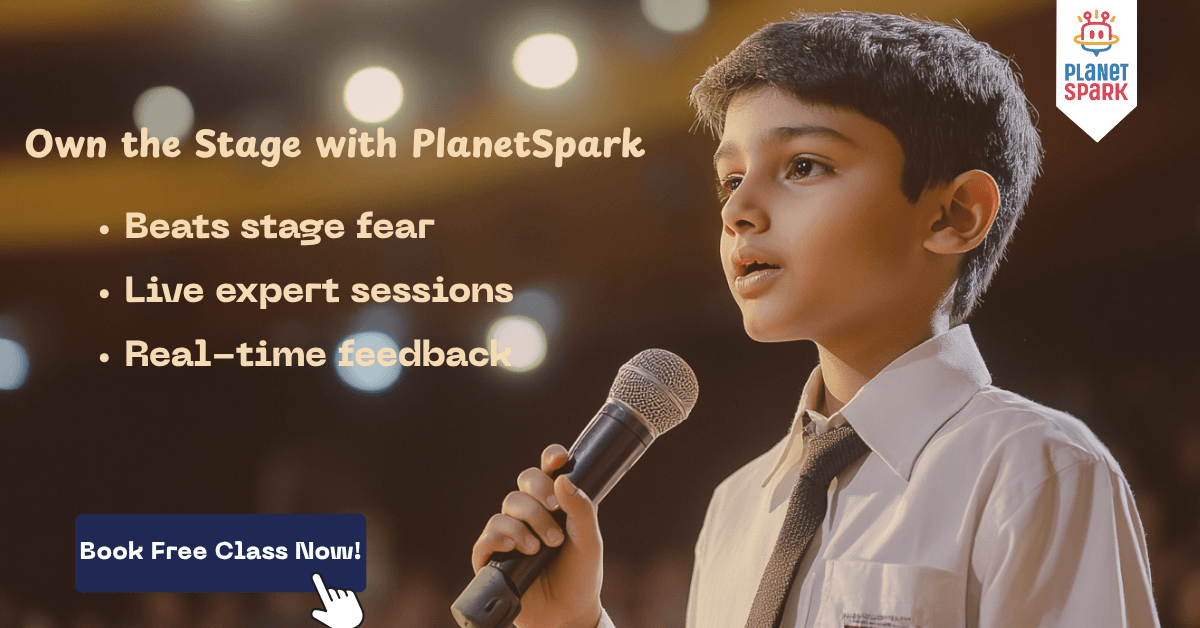How to Talk to Strangers Confidently: Tips for Kids and Adults

Table of Contents
- Why Learning to Talk to Strangers Matters
- Understand the Fear of Talking to Strangers
- The Benefits of Talking to Strangers
- Situations Where Talking to Strangers Is Helpful
- How to Talk to Strangers: Real-time Tips
- Teach Children How to Talk to Strangers Safely
- How to Talk to Strangers Online
- Overcoming Social Anxiety While Talking to Strangers
- Talking to Strangers in Different Cultures
- What to Avoid When You Talk to Strangers
- Building a Lifelong Habit of Talking to Strangers
- PlanetSpark’s Public Speaking Course
- Conclusion
- FAQs
- Want to Boost Your Child’s Communication Skills?
Have you ever stood awkwardly next to someone at a bus stop, in a queue, or at a party, wondering if you should say something? Talking to strangers is a skill that many find difficult, but it’s incredibly useful in both personal and professional life. Whether you're a child meeting classmates for the first time or an adult navigating a networking event, knowing how to talk to strangers can open doors to new friendships, career opportunities, and personal growth.
In this blog, we’ll explore the art of initiating conversations with strangers, why it matters, tips for doing it well, and how to stay safe while doing so.
Why Learning to Talk to Strangers Matters
For years, children have been told, "Don’t talk to strangers." While this advice is critical for safety, especially for young children, it can also create fear and social anxiety as we grow older. As adults, talking to strangers is essential:
Making new friends
Building business relationships
Traveling and exploring new cultures
Expanding your comfort zone
Networking at events or online communities
Mastering how to talk to strangers isn't about breaking social rules - it's about learning to do it confidently and safely.
Understand the Fear of Talking to Strangers
It’s completely normal to feel nervous before talking to someone you don’t know. The fear comes from uncertainty:
What if they ignore you?
What if you say something wrong?
What if they think you’re weird?
This fear is rooted in a survival mechanism. However, modern society thrives on communication. By understanding that everyone experiences this hesitation, you can begin to manage it better.
The Benefits of Talking to Strangers
You never know what a simple “Hello” could lead to. Some powerful benefits include:
Improved Confidence
Every time you talk to strangers, you're practicing communication. Over time, this boosts your self-esteem and public speaking skills.
Cultural Exposure
Striking up conversations during travel can introduce you to unique traditions, stories, and perspectives.
Professionals who know how to talk to strangers often build stronger networks and open more doors.

Learning and Inspiration
You may learn something new from someone else’s experience or perspective - something you wouldn’t find in a book or on the internet.
Situations Where Talking to Strangers Is Helpful
| Situation | Why It Helps |
|---|---|
| Networking events | Build professional relationships |
| Public transport | Beat boredom and learn local tips |
| School or college | Make new friends and understand different perspectives |
| Cafes or waiting rooms | Pass time and engage in light-hearted chats |
| Conferences or meet-ups | Share ideas, collaborate, and learn from experts |
How to Talk to Strangers: Real-time Tips
Let’s get into actionable strategies that help overcome awkwardness and fear:
1. Start with a Smile
A genuine smile makes you appear approachable. It breaks down the first layer of social resistance.
2. Begin with Small Talk
You don’t need a big speech. Something as simple as:
“Beautiful weather today, right?”
“Is this your first time here?”
“That’s a nice bag! Where did you get it?”
3. Ask Open-Ended Questions
Instead of questions that end in “yes” or “no,” try:
“What brings you here today?”
“How did you get into this field?”
Open-ended questions encourage longer and more engaging conversations.
4. Observe and Comment
Make a relevant comment about your shared environment. For example:
At a bookstore: “I love this author’s work - have you read this one?”
At a park: “The birds are especially active today!”
5. Use Names
If you catch their name, use it once or twice. It personalizes the conversation and builds a connection.
6. Be a Good Listener
It’s not just about what you say. Listening shows respect and interest.
7. Know When to Exit
If the other person isn’t receptive or seems busy, politely wrap up the conversation. A simple, “Nice talking to you!” is enough.
Teach Children How to Talk to Strangers Safely
For kids, the idea of talking to strangers must come with clear boundaries.
Teach the Difference Between Good and Bad Strangers
Good strangers: Police officers, teachers, parents of classmates.
Bad strangers: Anyone who asks them to go somewhere alone or offers gifts for no reason.
Role-play Common Scenarios
Practice what they might say in safe environments like:
Asking for help at a store
Greeting a new classmate
Talking to a friend’s parent
Safety Rule: Always Inform a Trusted Adult
Even if the conversation seems safe, children should always tell a trusted adult if they’ve interacted with someone new.

How to Talk to Strangers Online
In the digital world, talking to strangers is common, but it has its own rules.
Be Polite and Clear
Start with a friendly tone, especially if it’s someone you don’t know well. Avoid slang that can be misunderstood.
Avoid Oversharing
Don’t give out personal information like address, phone number, or passwords.
Recognize Red Flags
If someone makes you uncomfortable, asks inappropriate questions, or pressures you to meet in person, end the conversation.
Use Safe Platforms
Stick to verified websites and apps for learning or networking. Many platforms also let you report suspicious users.
Overcoming Social Anxiety While Talking to Strangers
If anxiety holds you back, here’s how to gently push past it:
Practice Mindfulness: Take a deep breath and stay present in the moment.
Start Small: Greet the security guard, the cashier, or a neighbor.
Set Micro Goals: “Today, I will say hi to one new person.”
Use Role Models: Watch how confident people handle conversations and mirror their techniques.
Talking to Strangers in Different Cultures
Cultural norms vary. In some countries, it’s normal to strike up a conversation on the subway. In others, silence is valued. Always observe local customs:
| Country | Social Norm |
|---|---|
| Japan | Silence in public spaces is respectful |
| USA | Casual small talk is common |
| France | Greetings like “Bonjour” are a must |
| India | Asking about family or food is considered warm |
What to Avoid When You Talk to Strangers
Oversharing personal problems
Talking only about yourself
Interrupting them
Making assumptions about race, gender, or identity
Being overly critical or negative
Be kind, be curious, and be respectful.
Building a Lifelong Habit of Talking to Strangers
The more you do it, the easier it becomes. Challenge yourself to step outside your bubble. Start conversations at:
Events
Cafes
Bookstores
Online communities
Airport lounges
Each conversation is a seed. Some grow into deep relationships; others are momentary exchanges. Either way, they make life richer.
PlanetSpark’s Public Speaking Course
In a world where communication defines success, confidence in public speaking is no longer optional- it’s essential. PlanetSpark’s Public Speaking Course is a transformative journey designed to help children speak with clarity, confidence, and conviction. With a proven curriculum, personalized training, and global exposure, PlanetSpark equips kids with the tools to shine on any stage- be it in school, on a debate platform, or at a TED-style talk.
1:1 Public Speaking Coaching by Experts
Every child is unique, and so is their learning style. That’s why PlanetSpark provides one-on-one coaching with certified communication experts trained in child psychology. Each session is tailored to your child’s needs, helping them grow at their own pace. Whether they’re shy beginners or budding performers, our coaches offer continuous, personalized feedback that focuses on real skill development, not rote learning.
Step-by-Step Skill Building That Covers All Core Areas
PlanetSpark’s public speaking curriculum is structured to build foundational and advanced skills through a carefully curated sequence. Children learn to master:
Facial Expressions: Convey emotions effectively and assertively.
Gestures: Use hands and body language to influence and engage the audience.
Voice Modulation: Add power and variation to speech using pitch, tone, and pace.
Speech Structuring: Build logical, well-organized content with clarity and flow.
Debating Skills: Learn rebuttals, counterarguments, turncoat formats, and mock parliaments.
Ethos, Pathos, Logos: Understand persuasive techniques used in powerful speeches.
Respectful Communication: Learn to agree or disagree with maturity and clarity.
These modules are designed to ensure that students not only speak, but speak with purpose, precision, and impact.
TED-Style Training That Inspires Greatness
PlanetSpark adopts a TEDx-inspired model that trains children to create and deliver speeches using the proven “Hook – Message – Story – Call to Action” structure. This approach encourages creativity, audience engagement, and impactful messaging - skills that serve learners for life.
Through storytelling and persuasive speaking, children learn how to inspire, lead, and influence just like global thought leaders.
Live Practice with Global Peers
Our students engage in live debates, storytelling sessions, panel discussions, and group activities with peers from over 13 different countries. This real-time global exposure helps students broaden their perspectives and sharpen their skills in a dynamic, multicultural environment.
Peer interaction not only builds confidence but also improves listening, critical thinking, and articulation as learners observe and respond to others’ ideas.
Video Feedback Loop & AI-Powered Analysis
Each student receives video recordings of their speeches to review with their coach. This video feedback loop allows for deep analysis of body language, tone, pace, and more. Additionally, students complete independent speech recordings that are analyzed using AI tools.
These tools provide insightful feedback on:
Pausing
Emphasis on keywords
Intonation patterns
Clarity of speech
A detailed report is shared with parents after each session, ensuring full transparency and progress tracking.
PlanetSpark’s Public Speaking Program isn’t just a course - it’s a journey of transformation. It helps children find their voice, build confidence, and become future-ready communicators.
Give your child the confidence to lead. Book a Free Trial Now!
Conclusion
The world is full of interesting people with fascinating stories. You don’t have to stay confined to the few people you already know. Whether you’re at a party, a seminar, or a park, having the courage to talk to strangers can bring new connections, opportunities, and joy.
Remember, it's not about becoming the most outgoing person in the room - it's about being open. Being human. And being brave enough to start.
FAQs
1. Why is it important to talk to strangers?
Talking to strangers helps you expand your network, learn new things, and improve communication and confidence.
2. Is it safe for kids to talk to strangers?
Kids should be taught how to identify safe strangers and always communicate under adult supervision. Role-playing and open conversations help a lot.
3. How can introverts learn how to talk to strangers?
Start with small steps: smile, say hello, or ask a simple question. With practice and comfort, conversations will come more naturally.
4. Can talking to strangers improve mental health?
Yes. Positive social interactions - even short ones - can improve mood, reduce stress, and increase feelings of belonging.
5. How do I talk to strangers without being awkward?
Focus on asking about the other person, stay relaxed, and remember they might feel just as awkward. Keep things light and respectful.
Want to Boost Your Child’s Communication Skills?
If you want your child to become more confident, expressive, and open to conversations with new people, PlanetSpark’s Public Speaking and Communication Skills Program is designed just for them.
Live classes with expert coaches
Fun speaking challenges and games
Real-life conversation practice
Personalized Communication Report
Record a video to get a AI generated personalized communication report for your child

Hi There, want to try these
tips for your child with
LIVE with our expert coach?
Let's check your child's
English fluency
